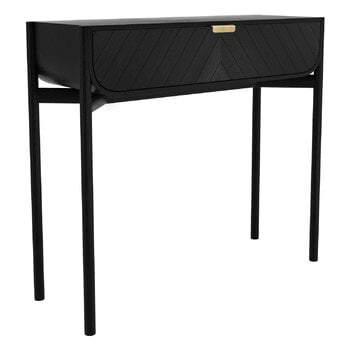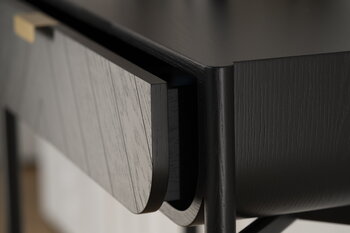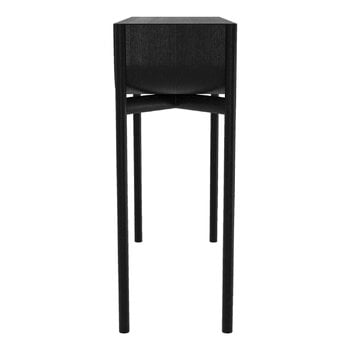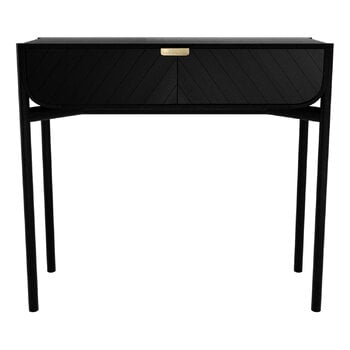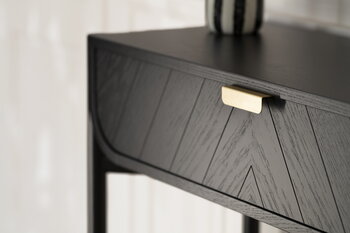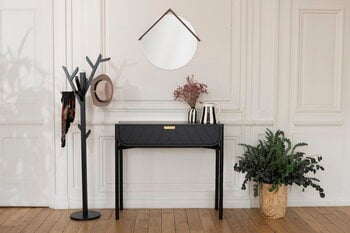Hartô’s Marius console table, designed by Pierre-François Dubois, is an elegant piece of furniture suitable for a variety of rooms, homes as well as public spaces. Inspired by nautical life, the shape of the console carries references to a ship's hull while the drawer's decorations resemble its sails. Made from black oak, Marius makes the perfect side table in the hallway or living room and works well as a dressing table in the bedroom, too. Brass details crown the look of the elegant walnut table.
Marius console table, black oak
Hartô
Description
Hartô’s Marius console table, designed by Pierre-François Dubois, is an elegant piece of furniture suitable for a variety of rooms, homes as well as public spaces. Inspired by nautical life, the shape of the console carries references to a ship's hull while the drawer's decorations resemble its sails. Made from black oak, Marius makes the perfect side table in the hallway or living room and works well as a dressing table in the bedroom, too. Brass details crown the look of the elegant walnut table.
Product details (12)
- Colour
- Black, brass
- Width
- 100 cm
- Depth
- 36.5 cm
- Height
- 90 cm
- Drawer size
- Leveys 78 cm, syvyys 29 cm, korkeus 11 cm
- Measurement details
-
Height to the bottom of the support grid: 65,5 cm
Height of the table top: 21 cm - Frame material
- Body and drawer in MDF and oak veneer, stained black.
- Base material
- Black stained solid oak
- Handles
- Brushed brass, clear varnish finish
- Weight
- 20 kg
- Notes
- Fully assembled. Drawer is removable.
- Care instructions
- Apply linseed oil every two years. Clean light stains quickly with a damp cloth.
- Product ID
Designer
Pierre-François Dubois is a Paris-based designer with a background in industrial design. Besides several French design schools, Dubois has also studied at Helsinki’s Aalto University, and the time spent in Finland has given his work a strong respect for natural materials and clean lines. Since 2013, Dubois has been a member of Hartô's team of artistic direction.
View all productsReviews (0)
Sustainability
The Product Sustainability Framework, our criteria of sustainable design, helps you find the most sustainable products in our selection. Read below which sustainability criteria this product has met.
Working conditions & labour 9/9
-
Equal opportunities for all employees
-
Commitment to UN Global Compact, fair compensation for all employees
-
Corporate responsibility requirements defined and communicated for suppliers
-
Systematic work for improved inclusion and well-being in the workplace
-
Transparent supply chain
-
Suppliers' compliance to a code of conduct ensured
-
Direct suppliers audited and certified
-
Compliance to the UN Guiding Principles on Business and Human Rights ensured in the supply chain
-
Support for community involvement in the supply chain
Eco-friendly production 7/9
-
Fair and resource-wise water-use in production
-
No incineration or landfilling of returned items
-
No use of endangered species as materials
-
No direct environmental emissions or waste (excl. GHGs) from production
-
The sustainability of direct suppliers' production is addressed and monitored
-
Material-efficient and ecological packaging
-
No potentially harmful chemicals used in own production
-
Production and material sourcing that respect biodiversity, animal rights, and natural ecosystems
-
Positive impact on nature’s well-being through operations that regenerate natural ecosystems
Climate impact 4/8
-
Company's direct greenhouse gas emissions identified and commitment to reduction
-
Product's carbon impact identified and commitment to reduction
-
Guidance on energy- and eco-efficient use of the product
-
Contribution to climate initiatives beyond the brand’s direct operations
-
Low-carbon or compensated transportation
-
Carbon footprint of the product calculated and goals set to reduce it
-
100 % renewable energy in own production and operations
-
Carbon neutral or carbon negative product
Sustainable materials 3/6
-
Sustainable and long-lasting material choices
-
No harmful or hazardous substances
-
Responsible raw material sourcing and production
-
Materials suited for circularity: monomaterials, recyclable finishings, renewable or recycled contents etc.
-
Ecological materials: natural, biodegradable, recyclable or recycled contents
-
Outstanding materials in terms of innovativeness, responsibility, sustainability and circularity: local production or sourcing, 100 % recycled content, C2C-certification etc.
Circular design 4/5
-
High aesthetic quality promoting long-term use of the product
-
Technically durable product design and material choices
-
Design for enduring life-long quality
-
Design and support for product maintenance, repair and upgradability
-
Innovative circular design solutions: circular service system, resale platform, remanufacturing, collection of used products, etc.
